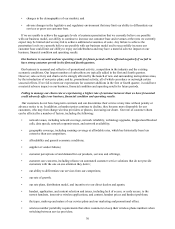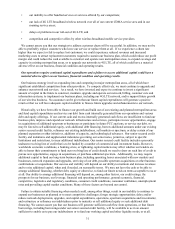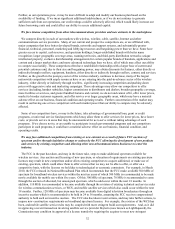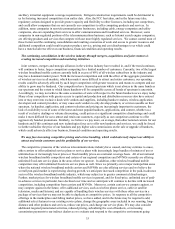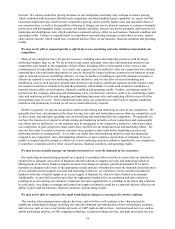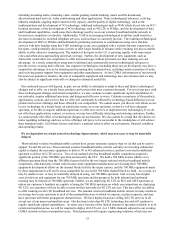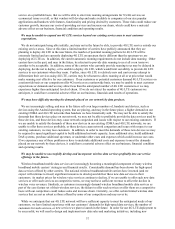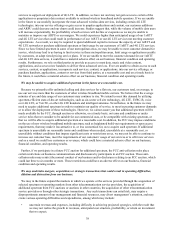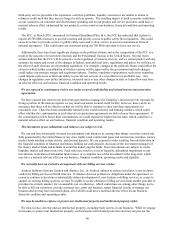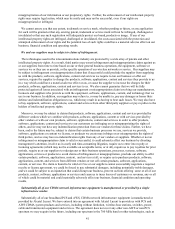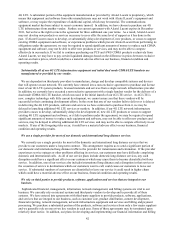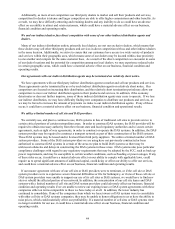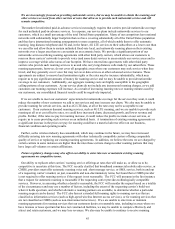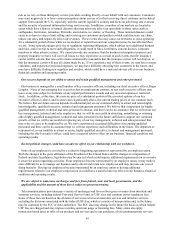Metro PCS 2010 Annual Report Download - page 50
Download and view the complete annual report
Please find page 50 of the 2010 Metro PCS annual report below. You can navigate through the pages in the report by either clicking on the pages listed below, or by using the keyword search tool below to find specific information within the annual report. 40
third-party service providers who experience cash flow problems, liquidity concerns or are unable to obtain or
refinance credit such that they may no longer be able to operate. The resulting impact of such economic conditions
on our customers, on consumer and discretionary spending and on our product and service providers could have a
material adverse effect on demand for our products, services and on our business, financial condition and operating
results.
The FCC, in March 2010, announced its National Broadband Plan. In it, the FCC has indicated that it plans to
require all 700 MHz licensees to provide roaming and priority access to public safety first responders. This could
cause us to have to provide service to public safety users and to deny service to our own customers at times of
national emergency. This could cause our customers using our 700 MHz spectrum to leave our service.
Additionally, there have been significant changes in the political climate and in the composition of the FCC as a
result of the outcome of recent state elections and the Presidential election in the United States. Several recent
actions indicate that the FCC will be proactive in the regulation of wireless services, and we cannot predict with any
certainty the nature and extent of the changes in federal, state and local laws, regulations and policy we will face, or
the effect of such elections on any pending legislation. For example, changes in the political climate could affect the
extent to which further consolidation of wireless carriers will be approved by the government and such changes
could reduce our strategic merger and acquisition options. Further, regulatory requirements, such as net neutrality,
could impose costs on us or limit our ability to provide our services in a cost effective or profitable way. Any
changes in regulation, new policy initiatives, increased taxes or any other changes in state or federal law may have
an adverse effect on our business, financial condition and operating results.
We are exposed to counterparty risk in our senior secured credit facility and related interest rate protection
agreements.
We have entered into interest rate protection agreements to manage the Company’s interest rate risk exposure by
fixing a portion of the interest expense we pay under our senior secured credit facility; however, there can be no
assurance that these will be effective or that we will be able to continue to enter into these agreements at a
reasonable cost. There has been considerable turmoil in the world economy and banking markets, which could
affect whether the counterparties to such interest rate protection agreements are able to honor their agreements. If
the counterparties fail to honor their commitments, we could experience higher interest rates, which could have a
material adverse effect on our business, financial condition and operating results.
The investment of our substantial cash balances are subject to risk.
We can and have historically invested our substantial cash balances in, among other things, securities issued and
fully guaranteed by the United States or any state, highly rated commercial paper and auction rate securities, money
market funds meeting certain criteria, and demand deposits. We are exposed to risks resulting from deterioration in
the financial condition of financial institutions holding our cash deposits, decisions of the investment managers of
the money market funds and defaults in securities underlying the funds. These investments are subject to credit,
liquidity, market and interest rate risk. Such risks may result in a loss of liquidity, substantial impairment to our
investments, realization of substantial future losses, or a complete loss of the investment in the long-term, which
may have a material adverse effect on our business, financial condition, operating results and liquidity.
We currently have an exclusive arrangement with our billing services vendor.
Amdocs Software Systems Limited and Amdocs, Inc., or Amdocs, subject to certain exclusions, is our exclusive
vendor for billing services in North America. If Amdocs does not perform its obligations under the agreement, or
ceases to continue to develop, or substantially delays development of, new features or billing services, or ceases to
support its existing billing systems, we may be unable to secure alternative billing services from another provider or
providers in a timely manner, for a reasonable cost or otherwise, which could cause us, among other things, not to
be able to bill our customers, provide customer care, grow our business, report financial results, or manage our
business and we may have increased churn, all of which could have a material adverse effect on our business,
financial condition and operating results.
We may be unable to enforce or protect our intellectual property and intellectual property rights.
We own, license, develop and use intellectual property, including trade secrets, in our business. While we engage
in measures to protect our intellectual property, such measures offer limited protection and may not prevent the


